18 start with S start with S
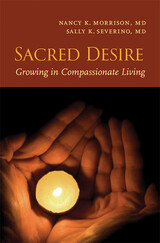
Is the call to spirituality embedded in human biology? Authors Nancy K. Morrison and Sally K. Severino draw on cutting-edge research, including the recent discovery of brain "mirror neurons" and the elucidation of the physiology of social affiliation and attachment, to make a bold case that we are, in fact, biologically wired to seek oneness with the divine. They have termed this innate urge "sacred Desire."
In their new book on the subject, ,em>Sacred Desire: Growing in Compassionate Living, Morrison and Severino, both highly esteemed academic psychiatrists, draw on neurophysiology, relationship studies, research on spiritual development, and psychotherapy to show how spirituality is intimately connected with our physical being. The authors offer several clinical examples of how recognizing sacred Desire can advance a person's healing and they provide an action plan for using Desire to move from fear to love of self, others, and all creation.
In addition to psychiatrists and neurophysiologists, who will undoubtedly welcome this significant contribution to their fields of study, Sacred Desire is sure to appeal as well to the much wider audience of spiritual seekers looking for intellectually and scientifically credible ways to understand spirituality in today's world.
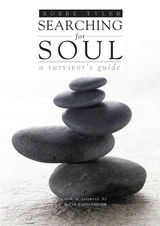

Shortlisted for the 2010 Eric Hoffer Award’s Montaigne Medal
To dive deep into your inner life. To explore what matters most: wisdom, happiness, the pain of loss, self–accountability, aging, and more. Searching for Soul: A Survivor’s Guide is a breathtakingly honest case study: a self-examination resulting in the discovery of a meaningful life.
Bobbe Tyler blends her story with in-depth commentary, framing each chapter as a response to one of a set of questions, appended to the book, entitled The Harvesting Wisdom Interview. In her search for fulfillment, Tyler asks and answers the most difficult questions about the trauma of mental illness, divorce, financial and emotional despair. The rewards of this hard–won wisdom belong not to her alone but by way of her unflinching examination of life’s many paths, dead ends, and circuitous routes — to anyone who has faced a life–choice gone wrong — or known the indescribable recovery from addiction or abuse, or longed for the peace that seems just out of reach. This searing self–appraisal provides hope and fellowship for those who seek to know themselves better.
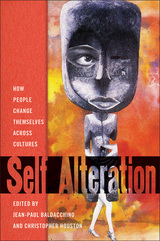
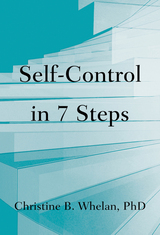

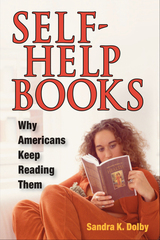
Understanding instead of lamenting the popularity of self-help books
Based on a reading of more than three hundred self-help books, Sandra K. Dolby examines this remarkably popular genre to define "self-help" in a way that's compelling to academics and lay readers alike. Self-Help Books also offers an interpretation of why these books are so popular, arguing that they continue the well-established American penchant for self-education, they articulate problems of daily life and their supposed solutions, and that they present their content in a form and style that is accessible rather than arcane.
Using tools associated with folklore studies, Dolby then examines how the genre makes use of stories, aphorisms, and a worldview that is at once traditional and contemporary. The overarching premise of the study is that self-help books, much like fairy tales, take traditional materials, especially stories and ideas, and recast them into extended essays that people happily read, think about, try to apply, and then set aside when a new embodiment of the genre comes along.
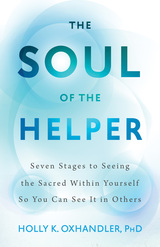
In their devotion to the well-being of others, caregivers routinely put their own well-being last and can unintentionally burn themselves out physically, emotionally, and spiritually. Their self-neglect, paired alongside a deep desire to help others, has the potential to stir up feelings of anger and resentment, leading to a sense of guilt and shame. They often believe that if they were to grant themselves any rest or grace, they would be at risk of failing in their duty.
In The Soul of the Helper, Dr. Holly K. Oxhandler shows caregivers and fellow helpers a more self-compassionate way to cope with their overwhelming responsibilities and to attend to their own needs, particularly when it comes to their mental health and spiritual journey. She invites them to pause and realize that if they let their personal resources run dry, they cannot possibly care for others as fully as they wish. In fact, their efforts are likely to cause more harm than good.
With a background in spiritually-integrated mental health, Dr. Oxhandler teaches helpers a seven-step process to slow down and reconnect with the stillness within themselves. It is in this space of stillness that Oxhandler guides helpers to reconnect with the “sacred spark” within their soul. By allowing themselves to enter that stillness, caregivers will recognize that they, too, are worthy of care. And with that realization, they will see anew the sacred spark that dwells inside everyone else, especially within those they’re helping.
As a social worker, researcher, and person of faith, Dr. Oxhandler writes in a warm and welcoming style, shares many relatable stories, and widens her scope to include believers of all faiths and spiritual traditions. Her book is for caregivers everywhere who sense the sacred spark within them saying, in effect: “Come to me, all you who are weary and burdened, and I will give you rest.”
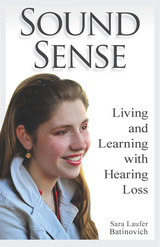
One out of every eight people between the ages of 18 and 67 in the United States has a hearing loss, estimated as 12 percent of the working-age population. Sound Sense: Living and Learning with Hearing Loss addresses the acute need of these people to function at the highest level in these income-earning years, the longest phase in their lives. In nine pointed chapters, author Sara Laufer Batinovich, who also has lost her hearing, shares her experience and knowledge in turning every challenge into an opportunity to become one’s best self-advocate.
Batinovich begins in the workplace, advising on winning a job, keeping it, and developing a long-term career, plus how to reduce stress and establish fulfilling professional relationships with colleagues. She offers tips on communication ranging from having sales people face you for easier speechreading to parsing boarding announcements at airports and play-by-play at ballparks. Her practical handbook also provides step-by-step guidance for getting a hearing aid or a cochlear implant and finding one’s way through prickly insurance claim mazes.
Sound Sense features information on finding a service dog, securing legally mandated accommodations for continuing education, tips on exercise and health, and even sensitive suggestions on strengthening personal relationships. Batinovich’s vivacious style and her own anecdotes add an upbeat, genuine sensibility to her book’s value as a positive guide to living with hearing loss.
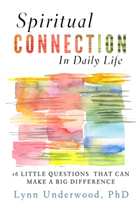
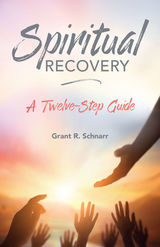
Twelve-step programs, which are based on psychological and spiritual growth, serve all who desire a path to freedom from destructive tendencies and consequent suffering. Using a twelve-step approach, Grant Schnarr presents readers with the tools needed to live a life guided by a greater awareness of both others and self. Filled with practical advice for incorporating these twelve principles into one’s life, Spiritual Recovery provides a road map for developing a deeper relationship with God and experiencing greater joy.
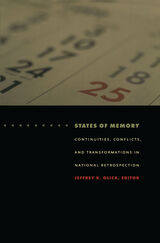
The contributors—including historians and social scientists—describe societies’ struggles to produce and then use ideas of what a “normal” past should look like. They examine claims about the genuineness of revolution (in fascist Italy and communist Russia), of inclusiveness (in the United States and Australia), of innocence (in Germany), and of inevitability (in Israel). Essayists explore the reputation of Confucius among Maoist leaders during China’s Cultural Revolution; commemorations of Martin Luther King Jr. in the United States Congress; the “end” of the postwar era in Japan; and how national calendars—in signifying what to remember, celebrate, and mourn—structure national identification. Above all, these essays reveal that memory is never unitary, no matter how hard various powers strive to make it so.
States of Memory will appeal to those scholars-in sociology, history, political science, cultural studies, anthropology, and art history-who are interested in collective memory, commemoration, nationalism, and state formation.
Contributors. Paloma Aguilar, Frederick C. Corney, Carol Gluck, Matt K. Matsuda, Jeffrey K. Olick, Francesca Polletta, Uri Ram, Barry Schwartz, Lyn Spillman, Charles Tilly, Simonetta Falasca Zamponi, Eviatar Zerubavel, Tong Zhang

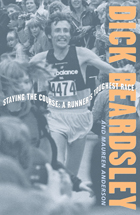
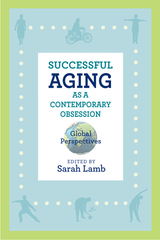
The contributors to Successful Aging as a Contemporary Obsession explore how the successful aging movement is playing out across five continents. Their chapters investigate a variety of people, including Catholic nuns in the United States; Hindu ashram dwellers; older American women seeking plastic surgery; aging African-American lesbians and gay men in the District of Columbia; Chicago home health care workers and their aging clients; Mexican men foregoing Viagra; dementia and Alzheimer sufferers in the United States and Brazil; and aging policies in Denmark, Poland, India, China, Japan, and Uganda. This book offers a fresh look at a major cultural and public health movement of our time, questioning what has become for many a taken-for-granted goal—aging in a way that almost denies aging itself.
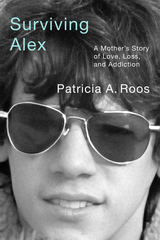
Weaving together a personal narrative and a sociological perspective, Surviving Alex movingly describes how even children from “good families” fall prey to addiction, and recounts the hellish toll it takes on families. Drawing from interviews with Alex’s friends, family members, therapists, teachers, and police officers—as well as files from his stays in hospitals, rehab facilities, and jails—Roos paints a compelling portrait of a young man whose life veered between happiness, anxiety, success, and despair. And as she explores how a punitive system failed her son, she calls for a community of action that would improve care for substance users and reduce addiction, realigning public health policy to address the overdose crisis.
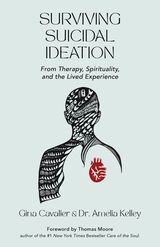
Surviving Suicidal Ideation embarks on a profound journey through the underlying causes, stages, and powerful emotions that shape the experience of having suicidal thoughts. More importantly, it provides proven tools, exercises, and steps to curtail and heal this preventable condition. With sensitivity and clarity, Dr. Amelia Kelley and Gina Cavalier explore the interconnectedness of addiction, mental health, and trauma.
Using a unique combination of analytic and spiritual practices, mindfulness, cutting-edge brain therapy, and compassionate support, this book offers therapies and self-help techniques with corresponding exercises; hand-inked illustrations by Cavalier; a foreword by Thomas Moore, New York Times bestselling author of Care of the Soul; and an extensive list of resources.
As a public speaker, Cavalier focuses on memoir-style storytelling about living with suicidal ideation. Together, the authors present holistic approaches to suicide prevention and debunk prevalent myths. They also go beyond individual healing, emphasizing the importance of community and relationships. Ultimately, Surviving Suicidal Ideation provides a nonjudgmental guide that enables the reader to develop self-compassion and work toward a positive future filled with hope and resilience.

A Swedenborg Perpetual Calendar, originally published in 1902 by the Swedenborg Publishing Association, is a daily devotional calendar consisting of thought-provoking quotes by Emanuel Swedenborg (1688–1772), an Enlightenment-era philosopher, scientist, and mystic whose ideas have inspired generations of religious thinkers and literary figures alike. The Swedenborg Foundation’s new edition of this insightful collection not only includes modern translations of excerpts from the most up-to-date editions and translations of his works but it also provides a fresh perspective on a variety of Swedenborg’s spiritual themes, such as divine love and wisdom, regeneration, divine providence, correspondences, and the afterlife. A useful tool for anyone in search of daily inspiration, A Swedenborg Perpetual Calendar is a timeless treasure that will help guide readers at each step of their spiritual journey.
READERS
Browse our collection.
PUBLISHERS
See BiblioVault's publisher services.
STUDENT SERVICES
Files for college accessibility offices.
UChicago Accessibility Resources
home | accessibility | search | about | contact us
BiblioVault ® 2001 - 2024
The University of Chicago Press









